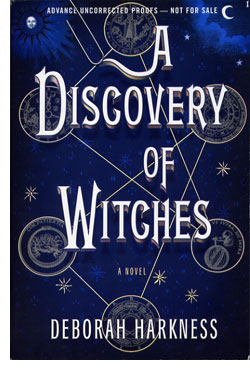 |
 |
 Deborah Harkness
Deborah Harkness
A Discovery of Witches
Reviewed by: Rick Kleffel © 2011
Viking / Penguin
USA First Edition Hardcover
ISBN 978-0-670-02241-0
Publication Date: 02-08-2011
592 pages, $28.95
Date Reviewed: 02-19-2011
Index:
Fantasy
General Fiction
The story of science is that of Xeno's Paradox. Even the biggest leaps we make only get us halfway to a goal we can, by definition, never achieve. In the history of science, the stories are not those of discoveries, but of the people who make those leaps, the humans who move us from one age to the next. They're different than you and I.
Deborah Harkness imagines just how different in her novel 'A Discovery of Witches,' which creates a pantheon of supernatural creatures — witches, vampires and daemons — that look pretty much like humans and have coexisted secretly within our world for all of recorded history. The novel lives up to its title. It is both a discovery within itself, a story of discovery and a plot that unfolds as discoveries by the reader.
The novel begins, appropriately enough, with the discovery of a manuscript by Diana Bishop. She's a scholar studying alchemical manuscripts to uncover the history of science and a witch who has tried to deny her heritage and live a strictly human life. But Ashmole 782, the manuscript she asks for at the Bodleian Library at Oxford, changes all that. The pages seem alive and underneath the mysterious alchemical formulae, there are letters writhing, another story crying to be told. Her discovery sets the world of supernatural creatures on alert. Threatening and unusual crowds of them are drawn to the library, to Diana. A handsome vampire, Matthew Clairemont appears to intervene and protect her. Her story is about to begin.
Harkness's supernatural fantasy is particularly well thought-out, and in fact, that's the point. Her vampires are scientists, trying to probe the mysteries of their own origin with DNA analysis. Her daemons are artists and outsize figures so full of creativity they're almost dangerous. Her witches are historians and keepers of wisdom. And all of them are threatened by Ashmole 782. There are not monsters here per se, though there are vampires, daemons and witches with evil intentions. Harkness takes a decidedly scientific and humanistic approach to the fantastic, which grounds the novel nicely and offers her the chance to immerse the reader in lots of entertaining details.
Despite the fact that 'A Discovery of Witches' is a carefully-architected fantasy, it is not a horror novel. The core of the story is discovery, not just of facts, but of a large cast of complicated and entertaining characters. Harkness tells the story mostly in the first person, from Diana's perspective, with some interludes in the third-person view of Matthew. It's a little bit disconcerting at first, but the power of the characters wins the reader over. Everyone in this book is a joy to read about, and there are a lot of characters. Harkness handles this large cast well, and the stories that unfold for each of the players are compelling reading.
A huge part of the appeal of this novel is its evocative use of great settings. Oxford, France and America each play a featured role here, and all of them are worthy of being considered characters in themselves. Book-lovers will particularly appreciate Harkness's evocation of the Bodleian library. From the environs of Oxford to the fields of France and a very colonial-seeming modern America, 'A Discovery of Witches' gives the reader a bargain on travel.
'A Discovery of Witches' keeps the plot humming along on a variety of levels. From the get-go, we know that romance is going to play a major part in the story, but Harkness does a wonderful job of keeping this understated and amazingly chaste. There's a sort of Romeo and Juliet plot that is engaging without ever overheating. Of course, there are lots of nice moments of peril, and a number of superb set-pieces in which character happily plays a key role. This is the sort of book you do not want to end.
We've all discovered our own feelings towards these creatures of fantastic literature; the witches, vampires and daemons. They're as well known as homo sapiens. Harkness's contribution to the science of storytelling and the history of fantastic literature is to make that discovery once again new, to bring us closer to a goal we can never reach. It advances the science of the human heart by reminding us of the importance of the unknowable, of magic.
|
 |
|
|
 |
| |
Review Archive
All Reviews alphabetized by author.
General Fiction
Non-Genre, general fiction and literature.
Horror
Supernatural fiction, supernatural horror and non-supernatural horror.
Science Fiction
Science fiction, science fantasy, speculative fiction, alternate history.
Fantasy
Fantasy, surrealism and magic realism.
Mystery
Crime, thrillers, mystery, suspense.
Non-Fiction
Non-Fiction, True Crime, Forteana, Reference.
Poetry
|
|
 |
|




